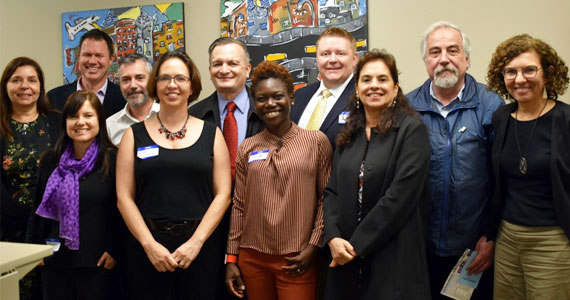First Global Urban Heath Pre-Symposium Session Worked at Bridging “Know-Do” Gap Among Urban Health Researchers

9/26/2017 9:54:44 AM
Urban health researchers and practitioners representing six countries and major U.S. cities gathered in Philadelphia Sept. 6 to take part in the first Global Urban Health Pre-Symposium Session. The session served as a kickoff event for the biennial Urban Health Symposium, hosted by the Drexel Urban Health Collaborative held Sept. 7-8. Featuring invited speakers from Colombia, Brazil, South Africa and Chile, to name a few, the Global Urban Health Session was an invitation-only event, emphasizing the global nature of urban health. Speakers and invitees provided plenty to discuss during the informal session, during which researchers exchanged experiences and findings from their home countries. All presentations at the meeting were recorded and are available to watch online.
Sharing Global Findings and Impact
Kicking off the session, members of the Urban Health Network for Latin America and the Caribbean and the SALURBAL (Salud Urbana en America Latina) project shared diverse examples of policy-relevant research. Presentations included health impact analyses of the Villa Viva program, which aimed to develop and integrate informal neighborhoods in Belo Horizonte; an assessment of the impact of road and transportation infrastructure on traffic-related injuries across Peruvian cities; the effects of a new city beltway on changes in air quality in São Paulo; and the effectiveness of physical activity programs in Bogota and other cities in Latin America. The SALURBAL team also shared plans for a review of health-related urban policies that have been implemented in Latin American cities in years past.
Later, urban health leaders from Australia, Africa, Asia, and Latin America shared perspectives on training needs for those in urban health. Speakers highlighted the role of interdisciplinary backgrounds, analytical skills, and the critical need to form networks and share information across regions. Speakers led a discussion on the importance of developing capacity and training for future generations of urban health researchers and leaders.
Getting Research into the Right Hands
When policymakers know how city characteristics and urban design impact health, they are able to create policies and interventions that make cities healthier. However, getting relevant research into the hands of government officials, city planners, and other decision-makers can be a challenge. Every year, close to two million research papers are published with no guarantee of reaching a wider audience, particularly policymakers. Speakers and participants discussed the urgency and complexity of bridging this “Know-Do” Gap, the gulf that exists between what is known and what is actually being done in urban health policy and practice. A central theme that emerged during the meeting was the role of research-policy partnerships as an avenue for addressing the Know-Do Gap.
Key Takeaways
The Global Urban Health Pre-Symposium session provided a starting point to better understand the important role of policy-relevant research in urban health in today’s global context. A few takeaways for the event include:
- The world is becoming more urbanized, leading to a greater need to study the drivers of urban health and identify effective policies and interventions
- The emerging challenges that accompany urbanization create a greater demand to prioritize urban health in global agendas and domestic plans.
- Urban growth necessitates responsive policies and programs, bringing opportunities to engage with and persuade policymakers tasked with these decisions.
- Effective and evidence-based policies and programs worldwide that improve health and sustainability serve as important examples.
- To persuade policymakers to incorporate evidence into policy planning and implementation, engagement and collaboration should be a part of all stages of the research process and not just an afterthought during dissemination.
- Involving policymakers in research planning and design raises their awareness, ensures that research questions are aligned with policy goals and possibilities, and establishes platforms for ongoing conversations and collaborations.
- The growth of research-policy partnerships has the potential to change cultures around the use of evidence in practice and result in the expansion of successful policies and approaches over time.
- Training in urban health to build capacity for the next generation of researchers and leaders is critical to the development and implementation of effective policies.
Invited Speakers
Many thanks to our participating speakers, including: Olga Lucía Sarmiento Dueñas, MD, PhD, MPH, University of the Andes, Colombia; Amelia Augusta Lima Friche, SLP, MPH, PhD; Waleska Caiaffa, MD, PhD, MPH, Federal University of Minas Gerais, Brazil; Nelson da Cruz Gouveia, MD, MSc, PhD, University of São Paulo, Brazil; Ricardo Jordán Fuchs, MSc, United Nations Economic Commission for Latin America and the Caribbean, Chile; Tony Capon, BMedSci, MBBS, PhD, FAFPHM, University of Sydney, Australia; Siddharth Agarwal, MBBS Urban Health Resource Center, India; and Tolullah Oni, MBBS, MRCP, MPH, DFPH, MD, of the University of Cape Town, South Africa. International guests were joined by Dornsife School of Public Health speakers, Dean and Director of the Urban Health Collaborative Ana Diez Roux, MD, PhD, MPH; Gina Lovasi, PhD, MPH, assistant professor and Urban Health Collaborative co-director; and Alex Quistberg, PhD, MPH, assistant research professor.